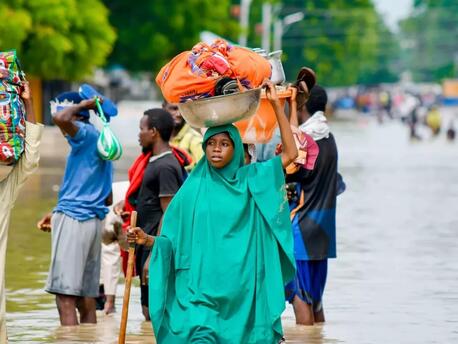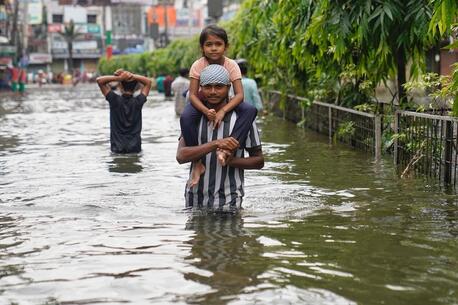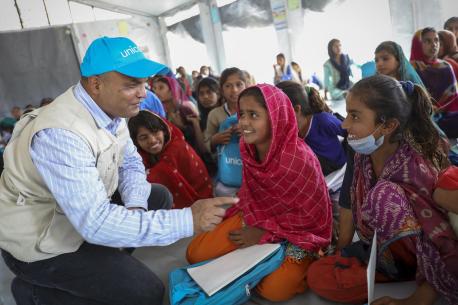
UNICEF in Pakistan
Climate change and related humanitarian crises are threatening children’s futures in Pakistan. While responding to emergency needs, UNICEF also works with partners to strengthen critical systems and services, building resilience against future stresses. Learn more, including how to help.
A humanitarian crisis in Pakistan
Pakistan has suffered a string of humanitarian disasters in recent years, including earthquakes and floods, the COVID-19 pandemic, cholera and other disease outbreaks and widespread malnutrition.
With political turmoil, sectarian violence and an economy on the verge of collapse, the situation for many children is dire. Millions continue to live in a state of upheaval and uncertainty.
The 2022 floods: an unprecedented disaster caused by climate change
During the 2022 monsoon season, three months of torrential rain churned through the country, causing an unprecedented amount of flooding. A disaster of epic proportions, it left one-third of the country underwater, killing 1,739 people (including 647 children), destroying livelihoods and leading to widespread homelessness, disease and hunger.
Thousands of schools were damaged or destroyed, cutting off access to education for millions of children — many of whom had only recently returned to the classroom after extended COVID-19 closures.
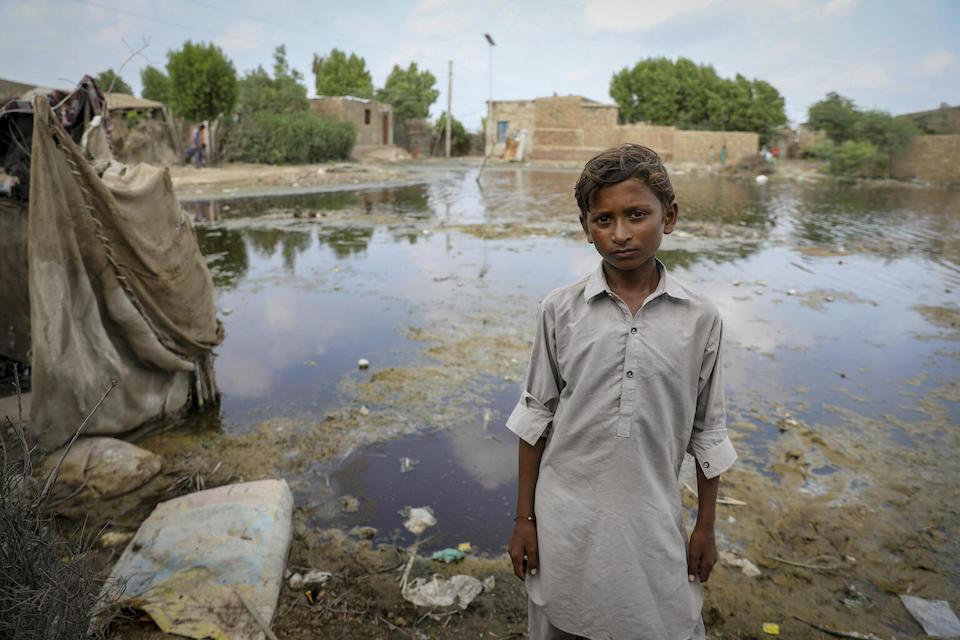
Extreme heat is another problem. Consistently high temperatures — not just in Pakistan but elsewhere across South Asia — are increasing health risks and making life even more difficult in many Pakistani communities.
Like many lower middle-income countries, Pakistan has done almost nothing to contribute to global warming, yet is disproportionately affected by it, and vulnerable children and women are bearing the brunt.
Climate change makes extreme weather events such as the floods in Pakistan more frequent and more destructive, and children too often pay the price. Learn more about UNICEF's response to the climate crisis.
How UNICEF is helping children in Pakistan
UNICEF played a critical role in providing shelter, medicines and education to children and families affected by the 2022 catastrophic floods.
Those relief efforts continue. Working collaboratively with the government, other UN agencies and NGO partners, UNICEF teams are supporting displaced families and assisting with their safe returns to their communities.
UNICEF is has also taken the lead on many interventions across all major program areas, including:
Water, sanitation and hygiene: UNICEF distributes safe drinking water and hygiene kits to families in need, while helping to rebuild damaged water supply facilities and make them climate safe.
Health: Priorities include reaching children and lactating and pregnant women with essential health care services at facilities or via mobile clinics, including immunizations; treating and preventing malaria, cholera and dengue; and providing access to mental health and psychosocial support for children and caregivers enduring the stresses of life on the front lines of climate change.
Nutrition: UNICEF is focused on improving child nutrition to prevent malnutrition, while screening and treating children suffering from severe acute malnutrition with Ready-to-Use Therapeutic Food (RUTF).
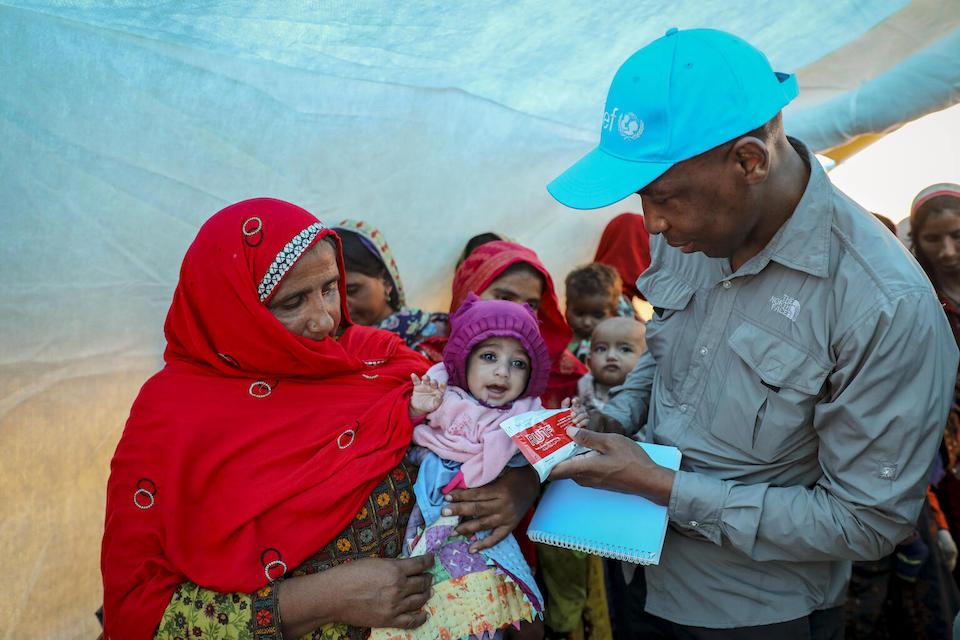
Education: UNICEF set up and continues to support temporary learning centers for out-of-school children, while rehabilitating and reopening damaged schools or building new ones, providing learning materials, training teachers in how to provide psychosocial support to students and working in communities to help re-enroll students and help schools reopen safely.
Protection: UNICEF is partnering with civil service organizations to bring child protection services to flood-affected children and families; deploying case workers and psychologists to support children who are at risk or survivors of violence, exploitation and abuse; strengthening gender-based violence prevention and response; and working in communities where girls are at high risk of early marriage to change practices and protect their rights. Learn more.
Building resilience against future crises
While delivering lifesaving emergency support to those with urgent needs, UNICEF also supports longer-term solutions aimed at strengthening whole systems, like health and education, and building community resilience against future crises. As part of that effort, specialists have been recruited to help communities prepare for future emergencies.
“The need for climate-resilient recovery is essential,” says UNICEF Representative in Pakistan Abdullah Fadil.
With children representing almost half of Pakistan’s population, he adds, investing in children is an investment in the country's future. “We must do everything in our power to ensure that girls and boys in Pakistan are able to survive and fully recover from the current disaster – and are prepared and protected from the next one.”
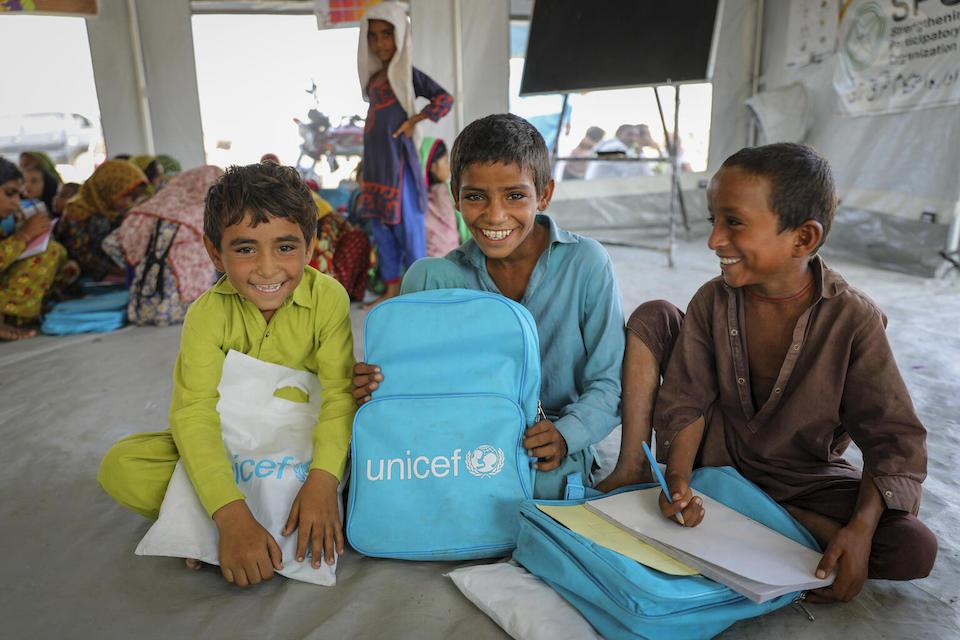
UNICEF relies on voluntary contributions from donor governments, civic groups, businesses and individuals to sustain its critical programs — and won't stop until every child is healthy, educated, protected and respected. Learn about different ways you can help.
